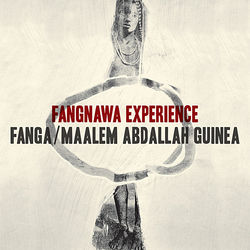Fangnawa Experience - afrobeat meets gnawa trance (release date 26 Nov)
.jpg?width=300&height=200) The Fangnawa Experience album is due to be released on 26th November 2012 on Strut Records...
The Fangnawa Experience album is due to be released on 26th November 2012 on Strut Records...
Fangnawa Experience is a groundbreaking fusion of two distinct African musical styles: West African Afrobeat, and North African ceremonial Gnawa Music.
Originally brought together by the forward-thinking Détours du Monde festival in Montpelier, French Afrobeat collective Fanga and Moroccan master musician Maâlem Abdallah Guinéa have found musical common ground on their performances and recordings together, depicted in this feature.
Rich, thought provoking, and effortlessly funky, Fangnawa Experience is an ambitious piece of work, and another significant chapter in the open-minded and cross-cultural climate for modern world music.
See the Making Of Fangnawa video here: youtu.be/0bhxkM_IGM4
Gna•wa:
A term referring both to a North African ethnic group, as well as a ritual musical style and ceremony performed by maâlem (master musicians), traditionally on the qraqab (heavy iron castanets) and the gimbri (three-string lute).
Fang•naw•a:
A cross-cultural musical fusion undertaken by French collective Fanga and Moroccan master musician Maâlem Abdallah Guinéa.
Performed primarily in Morocco and South-western Algeria, a traditional Gnawa ceremony re-creates the genesis of the universe, incorporating trance-inducing music, a clairvoyant, incense, and ecstatic dancing in a complicated liturgy. Gnawa music mixes classical Islamic Sufism with pre-Islamic African traditions, and in recent decades has begun to be performed outside of the traditional closed-door ceremonies, to the wider Moroccan public, and to global music audience at large.
In 2011, the Détours du Monde festival in Montpelier curated a collaboration between French Afro collective Fanga and Moroccan maâlem Abdallah Guinéa, creating a fusion of two distinct musical styles each based in tradition, African rhythms, and drawn-out, trance-inducing arrangements.
 “The project appealed to us, especially the trance aspect of both forms,” says Korbo, the Burkina Fasso-born vocalist of Fanga. “Our objective from the sessions was not so much to create an entirely new flow but more to bring the real Gnawa sound to some of our songs – we wanted to make the songs work so neither group’s sound was compromised”
“The project appealed to us, especially the trance aspect of both forms,” says Korbo, the Burkina Fasso-born vocalist of Fanga. “Our objective from the sessions was not so much to create an entirely new flow but more to bring the real Gnawa sound to some of our songs – we wanted to make the songs work so neither group’s sound was compromised”
The two styles prove to be naturally compatible throughout, building on compositions from Fanga’s 15-year catalog. Korbo and Guinéa share lead vocal duties, with Guinéa building his trademark ‘Fusion Trance’ through spiritual evocations, and rolling, hypnotic rhythms on the gimbri (three-stringed lute). Korbo’s lyrics serve up food for reflection, touching on the right to be different and promoting harmony between man and nature whilst denouncing the social injustices that result from an economic system out of control and designed to benefit the few.
Rich, thought provoking, and effortlessly funky, Fangnawa Experience is an ambitious piece of work, and another significant chapter in the open-minded and cross-cultural climate for modern world music.
For More Information Check Out:
http://fanga.fr/
http://www.strut-records.com/
Maâlem Abdallah Guinéa
 Descended from a renowned family of artists (his father, Boubker Guinéa, is considered as one of Morocco’s greatest of all maâlems) Abdellah Guinéa began playing the gimbri at age 12, and became a full maâlem and master musician at age 16. Along with his band, Nasse Ejadba, he quickly developed his own musical style, somewhere between traditional and modern Gnawa, which he calls “Fusion Trance.”
Descended from a renowned family of artists (his father, Boubker Guinéa, is considered as one of Morocco’s greatest of all maâlems) Abdellah Guinéa began playing the gimbri at age 12, and became a full maâlem and master musician at age 16. Along with his band, Nasse Ejadba, he quickly developed his own musical style, somewhere between traditional and modern Gnawa, which he calls “Fusion Trance.”
As well as gimbri, Guinéa plays guitar, banjo and mandolin and has continued the progression of his music by introducing Western sounds into the mix, effortlessly building a cultural bridge between different musical styles.
Fanga
A meeting of complementary personalities and cross-cultural energy, Fanga began to take shape in 1998, as hip-hop producer Serge Amiano returned to France from a trip to Africa with a selection of West African vinyl from the 60s and 70s. The nascent band, including Burkina Fasso-born rapper Korbo on vocals, worked with Tony Allen on his album Black Voices in 2000, and began releasing its own recordings in 2001.
Acclaimed by tastemakers like Gilles Peterson, Wax Poetics, and Rich Medina, the band has built a global following based on a dynamite live show, socially conscious lyrics, and an ever-evolving interpretation of classic Afrobeat and Highlife sounds.

